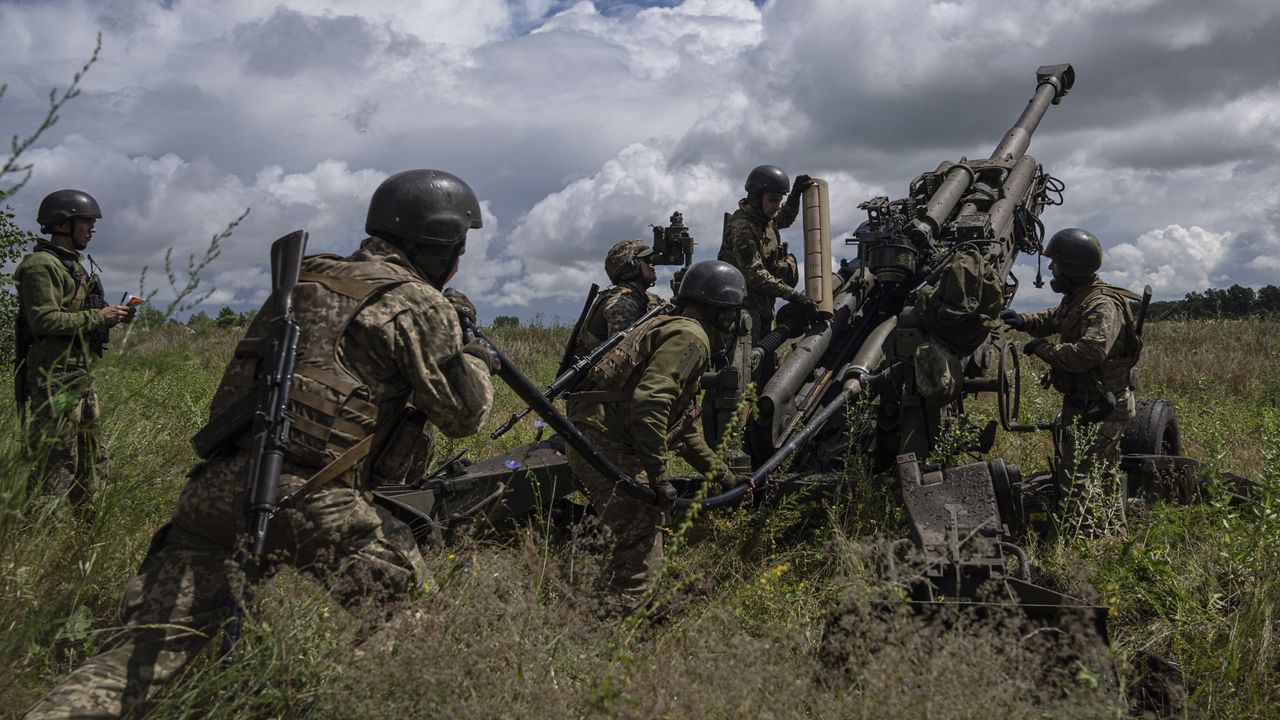The Biden administration announced Tuesday it is sending another $500 million in military aid to Ukraine and imposed sanctions targeting the Wagner Group, the Russian private military organization behind last week’s short-lived rebellion against President Vladimir Putin.
What You Need To Know
- The Biden administration announced Tuesday it is sending another $500 million in military aid to Ukraine and imposed sanctions targeting the Wagner Group
- The latest aid package includes more than 50 heavily armored vehicles and an infusion of missiles for air defense systems
- The sanctions are not be related to the Wagner Group’s actions in Ukraine or its short-lived rebellion in Russia, but rather in Africa
- The Treasury Department said it sanctioned four African-based gold companies with ties to Prigozhin and the Wagner Group and accused them of mining gold and then illegally selling it to help fund the mercenary group’s operations
The latest aid package includes more than 50 heavily armored vehicles and an infusion of missiles for air defense systems.
“This package includes key capabilities that will support Ukraine's counteroffensive operations such as mine-clearing equipment, armored vehicles and artillery rounds,” White House principal deputy press secretary Olivia Dalton said.
It's the 41st time since the Russian invasion into Ukraine in February 2022 that the U.S. has provided military weapons and equipment through presidential drawdown authority. The program allows the Pentagon to quickly take items from its own stocks and deliver them to Ukraine.
The Pentagon in a statement said the U.S. will send 30 Bradley Fighting Vehicles and 25 of the armored Stryker vehicles to Ukraine, along with missiles for the High-Mobility Artillery Rocket System (HIMARS) and the Patriot air defense systems. The package includes Javelin and high-speed anti-radiation (HARM) missiles, demolition munitions, obstacle-clearing equipment and a wide range of artillery rounds and other ammunition.
According to the Pentagon, the U.S. has delivered more than $15 billion in weapons and equipment from its stocks to Ukraine since the Russian invasion, and has committed an additional $6.2 billion in supplies that haven't yet been identified. The more than $6 billion extra is the result of an accounting error, because the military services overestimated the value of the weapons they pulled off the shelves and sent to Ukraine over the past year.
More broadly, the U.S. has also promised to send more than $16.7 billion in longer-term funding for various weapons, training and other equipment through the Ukraine Security Assistance Initiative, and an additional roughly $2 billion in foreign military financing.
The U.S. has at least $1.2 billion in drawdown authority that hasn't yet been committed but will expire at the end of this fiscal year on Sept. 30. The remaining $1.9 billion in USAI funds does not expire until the end of the next fiscal year, in September 2024.
The Wagner Group, which is led by oligarch Yevgeny Prigozhin, has been fighting alongside Russian soldiers in Ukraine. But shortly after voicing his frustration with the Russian Defense Ministry, his mercenaries left Ukraine to seize a military headquarters in a southern Russian city and then moved hundreds of miles toward Moscow before turning around.
The sanctions imposed Tuesday, however, are not be related to the Wagner Group’s actions in Ukraine or Russia, but rather in Africa, where it provides security services and paramilitary assistance for troubled regimes, including in the Central African Republic, Mali and Sudan.
The Treasury Department said it sanctioned four African-based gold companies with ties to Prigozhin and the Wagner Group and accused them of mining gold in the CAR and then illegally selling it to help fund the mercenary group’s operations.
“We believe that everywhere that Wagner goes, they leave death and destruction in their wake,” State Department spokesman Matthew Miller said. “They hurt local populations. They extract minerals and extract money from the communities where they operate. And so we would continue to urge governments in Africa and elsewhere to cease any cooperation with Wagner and not pursue any further.”
Also sanctioned was Andrey Nikolayevich Ivanov, a Wagner Group executive who the U.S. alleges “worked closely with Prigozhin’s entity Africa Politology and senior Malian government officials on weapons deals, mining concerns, and other Wagner Group activities in Mali.”
The sanctions allow the U.S. government to seize any property or interests in property in the United States or in the control of people in the U.S. It also prohibits anyone from doing business with the sanctioned parties.
The U.S. has previously sanctioned the Wagner Group and designated it a transnational criminal organization.



